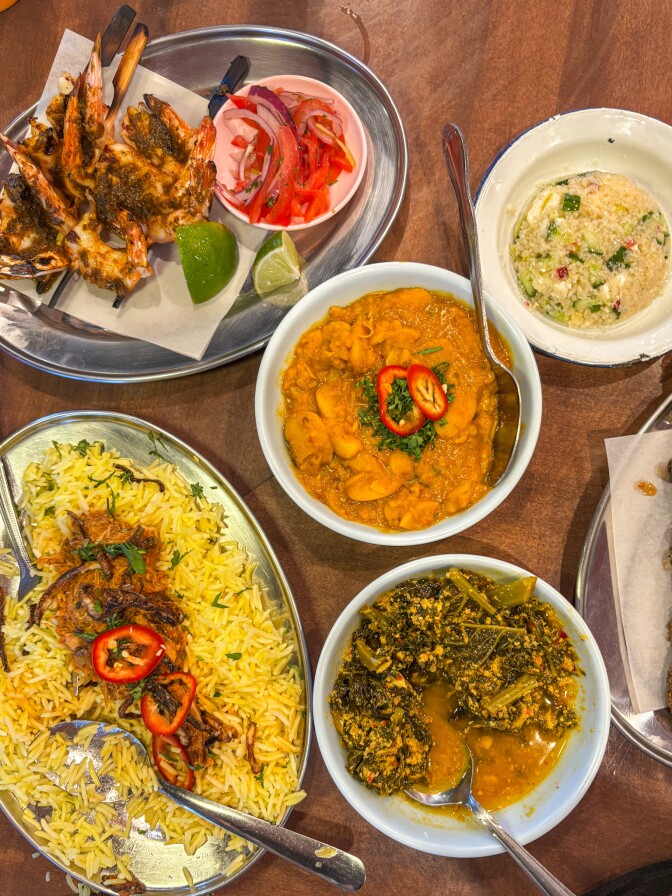Jikoni means kitchen in Swahili, and it’s where chef Kiano Moju, author of AfriCali Recipes from My Jikoni, combines her unique blend of Californian and African cuisines.
On Sept 18, she’ll be joining LAist for a live cooking demo and conversation as part of our Cookbook Live event series, in conjunction with the James Beard organization, at the Crawford in Pasadena.
Her book was named the best cookbook by the New York Times and Bon Appétit last year, and she’s continued to turn heads this year with her impressive pop-up Jikoni in Culver City.
Moju was born in California to African immigrant parents — her mother is Kenyan, and her father is Nigerian. She primarily grew up in the East Bay in Northern California, and spent her summers visiting her grandparents' ranch in Kenya, where she learned traditional cooking methods of the Maasai, an ethnic group in Eastern Africa.
She describes her background as having both African and American food traditions. However, in her desire to fit in growing up, she says she sometimes “forget” the sack lunch her mother would pack, opting instead for bean and cheese burritos sold at school.
On weekends, Moju would attend gatherings held by local African community members, including Kenyans, Nigerians, Ethiopians and Senegalese.
“ During my childhood, all the small African countries would hang out. Everyone was together, sharing their culture,” Moju said.

After attending college at Syracuse University, Moju moved to London for graduate school, where she earned her Master's degree in publishing with a focus in food media at the University of the Arts London.
During her time there, she hosted her first pop-up at a local pub. She called it Orange Street, named after the street she grew up on in Oakland. She began putting her own spin on the cooking she’d grown up with, making African tacos, using a variety of traditional dishes, such as fire-grilled shrimp, slathered with a South African compound butter known as Peri Peri — known for its light spice made with cayenne and sweet paprika — and Berbere braised pork, a spice mixture found in Ethiopian and Eritrean cuisines, with its sneakily peppery spice and hints of citrus.

After completing her education, Moju moved to L.A. in 2017, where she began working with Tasty, an internet cooking series on BuzzFeed. There, Moju created a series of videos focused on cooking and baking, all while staying true to African staples like Nigerian jollof rice, — a tomato-based rice dish seasoned with curry and spices — and Kenyan beef samosas, which she enjoyed during her family’s holiday get-togethers. She started developing a collection of recipes that would eventually become her book, AfriCali, published in 2024.
Moju aims to make her dishes accessible and straightforward. The main ingredients for the recipes in AfriCali — such as tomato, garlic, onion, chicken, beef and lamb — can be found at any local grocery store. Other specialty ingredients, like berbere spice and egusi, a crushed melon seed traditionally used as a soup base in Nigerian dishes, can be easily purchased online.
" Whether it's Kenyan food, Nigerian food, or something inspired by, I really want these recipes to fit into people’s everyday cooking,” Moju said.
Speaking of egusi, I got to try some at Moju’s pop-up Jikoni at the Citizen Public Market in Culver City, where she’ll be until October. There, she served the traditional West African ingredient with cooked-down kale, where the bitterness of the greens and the nutty flavors of the crushed melon seeds came together.

Moju has her hopes set on continuing the pathway she’s created for herself with AfriCali and her Jikoni pop-up, aiming to bring African culture to the forefront of mainstream culture. She seeks to expand the brand by incorporating more recipes, restaurant residencies, spice blends, sauces and potentially even homewares.
“ I'm trying to build an ecosystem where I'm teaching people about the food by creating a little world that people can jump into, at whatever point makes sense for them,” Moju said.
More Info: Tickets for Cookbook Live with Kiano Moju at the Crawford at 7 p.m., Sept.18, can be purchased here.












